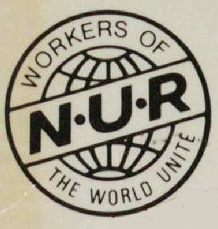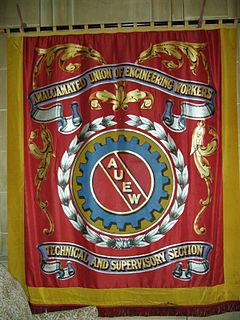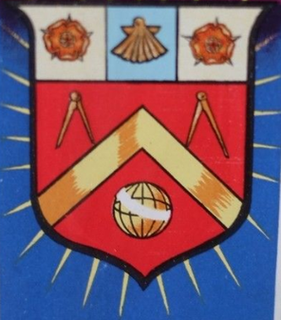Related Research Articles
In British politics, an affiliated trade union is one that is linked to the Labour Party. The party was created by the trade unions and socialist societies in 1900 as the Labour Representation Committee and the unions have retained close institutional links with it.

The National Union of Seamen (NUS) was the principal trade union of merchant seafarers in the United Kingdom from the late 1880s to 1990. In 1990, the union amalgamated with the National Union of Railwaymen to form the National Union of Rail, Maritime and Transport Workers (RMT).

The National Union of Railwaymen was a trade union of railway workers in the United Kingdom. The largest railway workers' union in the country, it was influential in the national trade union movement.

The Technical, Administrative and Supervisory Section (TASS) was a British trade union.
The Association of Supervisory Staffs, Executives and Technicians (ASSET), was a British trade union, chiefly representing supervisors in the metal working and transport industries. It was formed from the National Foremen's Association, founded in 1918.

The Association of Professional, Executive, Clerical and Computer Staff (APEX) was a British trade union which represented clerical and administrative employees.

The Iron and Steel Trades Confederation (ISTC) was a British trade union for metal-workers and allied groups, being the largest union in these fields. It was formed on 1 January 1917 as a merger of existing steel-workers' unions and it is now part of Community.
Community is a UK trade union which formed in 2004. The union represents workers in a diverse range of sectors, including iron and steel, domestic appliance manufacturing, clothing, textiles, footwear, road transport, betting and gaming and call centres, as well as workers in voluntary organisations, workshops for visually impaired and disabled people, community-care providers and housing associations. Although the former trade unions which amalgamated to form Community were all craft unions or industrial unions, Community is now a general union. Community has merged or transferred engagements with a number of smaller unions, some of which have become sections within Community. These include the National League of the Blind and Disabled (NLBD), the National Union of Domestic Appliance and General Operatives (NUDAGO), the National Union of Knitwear, Footwear & Apparel Trades (KFAT), the British Union of Social Work Employees (BUSWE), the Prison Service Union and the UFS.

The Amalgamated Engineering Union (AEU) was a major British trade union. It merged with the Electrical, Electronic, Telecommunications and Plumbing Union to form the Amalgamated Engineering and Electrical Union in 1992.

The Electrical, Electronic, Telecommunications and Plumbing Union, known as the EETPU, was a British trade union formed in 1968 as a union for electricians and plumbers, which went through three mergers from 1992 to now be part of Unite the Union.

The National Union of Agricultural and Allied Workers (NUAW) was a trade union in the United Kingdom which existed between 1906 and 1982. It represented farmworkers.

The Amalgamated Society of Woodworkers (ASW) was a British trade union representing carpenters, joiners and allied trades. The ASW was formed in 1921 by the amalgamation of two smaller unions. It was itself merged into the Union of Construction, Allied Trades and Technicians in 1971.

The Post Office Engineering Union (POEU) was a trade union in the United Kingdom. It represented engineering staff in the Post Office, mostly working in telecommunications.
The National Union of General Workers (NUGW) was an early general union in the United Kingdom, the most important general union of its era.

The Amalgamated Union of Building Trade Workers (AUBTW) was a British trade union.

The Confederation of Shipbuilding and Engineering Unions (CSEU), often known as the Confed is a trade union confederation in the United Kingdom.
The United Textile Factory Workers' Association (UTFWA) was a trade union federation in Great Britain. It was active from 1889 until 1975.
The General Council of the Trades Union Congress is an elected body which is responsible for carrying out the policies agreed at the annual British Trade Union Congresses (TUC).

The Electrical Trades Union (ETU) was a trade union representing electricians in the United Kingdom, much of its membership consisting of wiring fitters and telephone engineers.
John Baldwin was a British trade union leader.
References
- ↑ Labour Party, Report of the Forty-Fifth Annual Conference of the Labour Party, p.74
- ↑ Eaton, Jack; Gill, Colin (1981). The Trade Union Directory. London: Pluto Press. p. 92-95.
- ↑ Labour Party, Report of the Sixty-Third Annual Conference of the Labour Party, pp.158-180
- ↑ Labour Party, Report of the Sixty-Fifth Annual Conference of the Labour Party, pp.308-330
- ↑ Labour Party, Report of the Sixty-Ninth Annual Conference of the Labour Party, pp.289-312